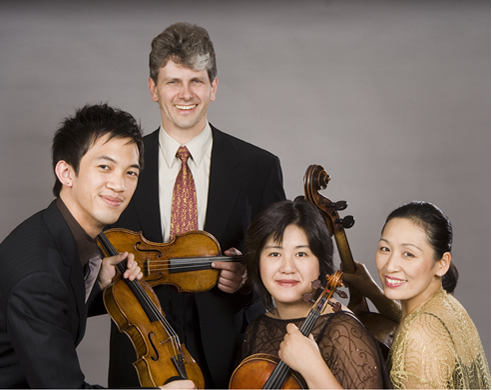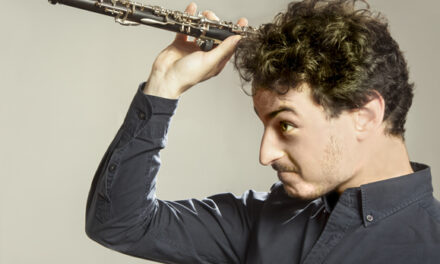This preview has been provided by St. Stephen’s Concert Series.
On Sunday, April 23, at 4:00 pm, the world famous Borromeo String Quartet will return to Stephen’s Episcopal Church in Durham to close the 2016-2017 season of the St. Stephen’s Concert Series. Their program will be devoted to just two works: Bach’s Goldberg Variations, as transcribed for string quartet by first violinist Nicholas Kitchen, and a late Beethoven quartet, The String Quartet in E-flat major, Op, 127.
As always, the players will read music off their lap tops. In the case of the Goldberg Variations all four players will play from the very clean full score which Nicholas produced using the computer program Sibelius. When they perform Op. 127, however, Nicholas will be reading from a facsimile of Beethoven’s manuscript of the work, a messy, scarcely legible affair, containing smudges, erasures, cross-outs, and coffee stains. The other three players will use cleanly printed Henle parts to which they added personal markings during rehearsal, including marks coming directly from the manuscript.
Why does Nicholas prefer to play from Beethoven’s messy manuscript rather than a clearly printed Henle part? The answer is that Beethoven’s manuscript is more informative; it communicates in greater detail the markings Beethoven made to try to guide the performers. Whereas the Henle parts use only 9 dynamic markings (pp, mp, f, etc.), Nicholas has found in Beethoven’s manuscripts about 20 such dynamic markings. In the Henle editions of Beethoven’s music only two types of staccato markings appear, but in his manuscripts Beethoven uses two additional staccato markings.
Lewis Lockwood, who has written one of the most important biographies of Beethoven and is considered by many America’s leading Beethoven scholar, has been enthusiastic about the discoveries Nicholas has made. Lockwood was instrumental in making possible Nicholas’ visit to the Beethoven House in Bonn for further study. Since then, he invited Nicholas to be one of three presenters of papers on April 5 at a two day international Symposium on Op. 131 held at Beethoven Institute at Boston University.
In the meantime, the quartet’s manuscript-based performances of Beethoven have garnered praise from music critics.
In a review titled “Playing Beethoven in the Computer Age,” the San Diego critic Ken Herman wrote, “It was nothing less than astonishing to note how different Borromeo made Op. 130 sound: instead of the driving force most ensembles bring to Beethoven, Borromeo released each movement’s buoyant internal propulsion. These players uncorked Beethoven’s champagne.”
Another San Diego critic went even further in a review titled “The Borromeo Quartet blows at least one mind.” “I don’t think my ears are accustomed to the detailed musicianship that the Borromeos brought to the table. The performance could well fall under the discipline of eschatology — the metaphoric ‘end of ordinary reality and reunion with the Divine.'”
The fabled virtuosity of Bach’s Goldberg Variations has proved a challenge for the world’s greatest keyboard artists. To judge by the score (and that is the only way to judge, since the piece has yet to be performed) Nicholas’ transcription of the work is no less virtuosic. Lightning fast interchanges which occur in five of the variations promise to be great fun to hear and to watch.
A half hour Pre-Concert Discussion will take place at 3:00 pm and a reception will follow he concert. Tickets ($25) will be available at the door (cash or check only) with free admission for those 18 or under. The church is located at 82 Kimberly Drive, Durham, NC 27707.












